Related Research Articles

Werner Hans Erhard is an American author and lecturer known for founding est, which operated from 1971 to 1984. He has written, lectured, and taught on self-improvement.
Succession planning is a process and strategy for replacement planning or passing on leadership roles. It is used to identify and develop new, potential leaders who can move into leadership roles when they become vacant. Succession planning in dictatorships, monarchies, politics, and international relations is used to ensure continuity and prevention of power struggle. Within monarchies succession is settled by the order of succession. In business, succession planning entails developing internal people with managing or leadership potential to fill key hierarchical positions in the company. It is a process of identifying critical roles in a company and the core skills associated with those roles, and then identifying possible internal candidates to assume those roles when they become vacant. Succession planning also applies to small and family businesses where it is the process used to transition the ownership and management of a business to the next generation.
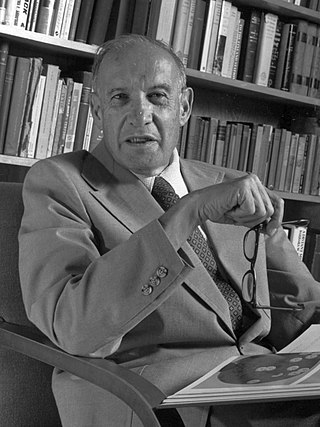
Peter Ferdinand Drucker was an Austrian-American management consultant, educator, and author, whose writings contributed to the philosophical and practical foundations of the modern business corporation. He was also a leader in the development of management education, he invented the concept known as management by objectives and self-control, and he has been described as "the founder of modern management".
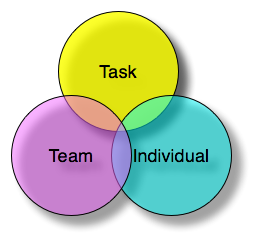
Functional leadership theory is a theory for addressing specific leader behaviors expected to contribute to organizational or unit effectiveness. This theory argues that the leader's main job is to see that whatever is necessary to group needs is taken care of; thus, a leader can be said to have done their job well when contributing to group effectiveness and cohesion.

John Paul Kotter is the Konosuke Matsushita Professor of Leadership, Emeritus, at the Harvard Business School, an author, and the founder of Kotter International, a management consulting firm based in Seattle and Boston. He is a thought leader in business, leadership, and change.

John Thomas Chambers is the former executive chairman and CEO of Cisco Systems.

Charles Brian Handy CBE is an Irish author/philosopher specialising in organisational behaviour and management. Among the ideas he has advanced are the "portfolio career" and the "Shamrock Organization".

William W. George is an American businessman and academic. He is a professor of management practice, and a Henry B. Arthur Fellow of Ethics at Harvard Business School. He previously served as chairman and chief executive officer of Medtronic.
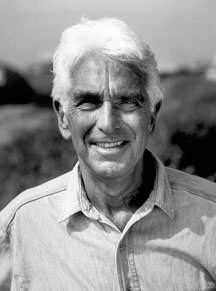
Warren Gamaliel Bennis was an American scholar, organizational consultant and author, widely regarded as a pioneer of the contemporary field of Leadership studies. Bennis was University Professor and Distinguished Professor of Business Administration and Founding Chairman of The Leadership Institute at the University of Southern California.
Constantinos C. Markides is a Cypriot management educator and, since 1990, the Robert P. Bauman Professor of Strategic Leadership at London Business School. He is known for his work on strategic disruption and business models which is particularly illustrated in his book Game Changing Strategies published in 2008. He was listed among the Forbes.com list of Most Influential Management Gurus (2009).

Lance H.K. Secretan is a British-Canadian author of business books, best known for his work in leadership theory and how to inspire teams. A former child actor, from 1967 to 1980, Secretan was the managing director of Manpower Limited, the British subsidiary of Manpower Inc. Between 1980 and 1985, he taught leadership at McMaster and then York University in Canada and since 1985, he has worked as an author, independent management consultant, and coach and keynote speaker.

Alan George "A. G." Lafley is an American businessman who led consumer goods maker Procter & Gamble (P&G) for two separate stints, from 2000 to 2010 and again from 2013 to 2015, during which he served as chairman, president and CEO. In 2015, he stepped down as CEO to become executive chairman of P&G, eventually retiring in June 2016.
A business fable is a motivational fable, parable or other fictional story that shares a lesson or lessons that are intended to be applied in the business world with the aim to improve leadership skills, personal skills, or the organizational culture. Business fables show readers how the different leadership, project management, and other tools can be used in real life situations. The genre saw a peak in the early 2000s.
Ram Charan is an Indian-American business consultant, speaker, and writer resident in Dallas, Texas.
True North: Discover Your Authentic Leadership, by Bill George and Peter Sims, is a best-selling 2007 business book and follow-up to George's 2003 Authentic Leadership. The book—based on interviews between George and over 125 leaders including David Gergen, Starbucks CEO Howard Schultz, and Sir Adrian Cadbury—discusses the qualities and effectiveness of "authentic leadership" and its viability in the business and political worlds.
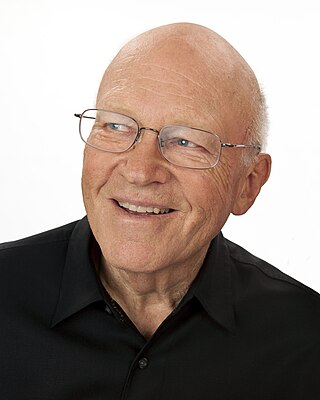
Kenneth Hartley Blanchard is an American author, business consultant and motivational speaker. His writing career includes 60+ published books, most of which are co-authored books. His most successful book, The One Minute Manager, has sold over 15 million copies and been translated into many languages.
Alan Axelrod is a prolific author of history, business and management books. As of October 2018, he had written more than 150 books. Axelrod resides in Atlanta, Georgia.

Subir Chowdhury is the author of 15 books and noted for his work in quality and management. He is currently the chairman and CEO of ASI Consulting Group, LLC, in Bingham Farms, Michigan.
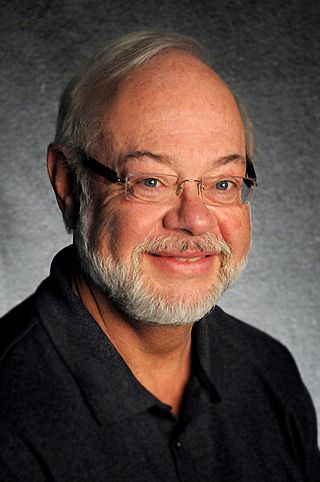
Michael W. Allen is an American software developer, educator, and author. He is known for his work on e-learning, and led the development of the Authorware software.
Barry Cunningham is a British publisher, who worked for various publishers including Penguin Books and Bloomsbury before setting up Chicken House publishing in 2000. He is most well known for signing J. K. Rowling and publishing Harry Potter and the Philosopher’s Stone in 1997.
References
- ↑ John A. Byrne (Dec 23, 2014). "B-school Dean of the Year: Dartmouth's Paul Danos – Fortune". Fortune . Retrieved 24 September 2015.
- ↑ ANDREA USEEM (Feb 12, 2009). "The 10 Best Leadership Books of All Time". The Washington Post . Retrieved 24 September 2015.
- 1 2 The Management Gurus: Lessons from the Best Management Books of All Time By Chris Lauer
- ↑ Welch, Jack; Byrne, John A. (2003-10-01). Jack: Straight from the Gut. Grand Central Publishing. pp. 117–. ISBN 978-0-7595-0921-4 . Retrieved 27 September 2015.
- ↑ Israelite, Larry (2007). Lies about Learning: Leading Executives Separate Truth from Fiction in This $100 Billion Industry. American Society for Training and Development. pp. 74–. ISBN 978-1-56286-498-9 . Retrieved 27 September 2015.
- ↑ Mica Schneider Rating the Management Gurus Business Week 2001
- ↑ Salka, John (2005-02-22). First In, Last Out: Leadership Lessons from the New York Fire Department. Penguin Group US. pp. 221–. ISBN 978-1-101-21621-7 . Retrieved 21 March 2014.
- ↑ Lauer, Chris; Summaries, The Editors at Soundview Executive Book (2008-07-31). The Management Gurus: Lessons from the Best Management Books of All Time. Penguin Group US. ISBN 978-1-4406-3761-2 . Retrieved 21 March 2014.
{{cite book}}:|first2=has generic name (help) - ↑ STEPHEN KOTKIN (February 3, 2008). "In Praise of the Decisive C.E.O." The New York Times. Retrieved 24 September 2015.
- ↑ Harvey Schachter. "Seven sins of succession planning – The Globe and Mail". The Globe and Mail . Retrieved 24 September 2015.
- ↑ Jonathan A. Knee (November 14, 2014). "Capping a Strong Performance With an Exit Strategy". The New York Times. Retrieved 24 September 2015.
- ↑ "Making a success of succession". The Economist . Nov 29, 2014. Retrieved 24 September 2015.
- ↑ Hesselbein, Frances; Goldsmith, Marshall (2011-02-17). The Leader of the Future 2: Visions, Strategies, and Practices for the New Era. John Wiley & Sons. pp. 141–. ISBN 978-1-118-04725-5 . Retrieved 21 March 2014.
- ↑ Randall Rothenberg (14 February 2003). "Noel M. Tichy: The Thought Leader Interview". Strategy Business. Retrieved 5 October 2015.
- ↑ "Noel Tichy". michiganross.umich.edu. Retrieved 2020-09-03.
- ↑ John Byrne (27 October 1997). "Those Who Can, Do. Those Who Excel, Teach". Business Week . Retrieved 4 October 2015.